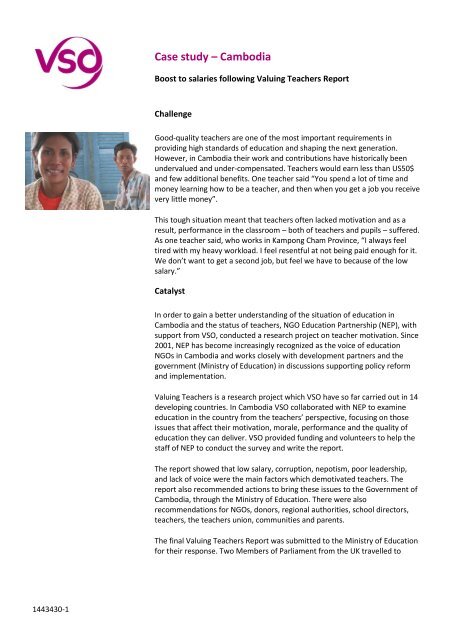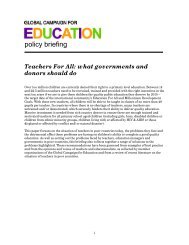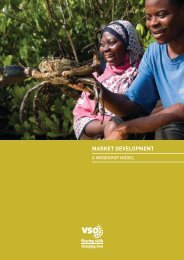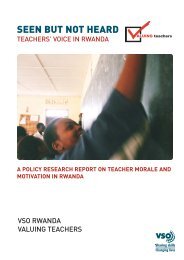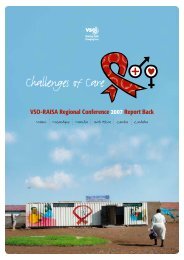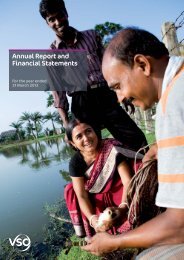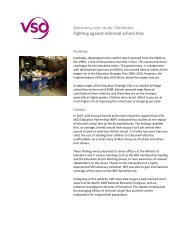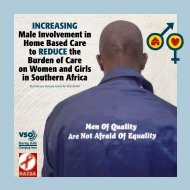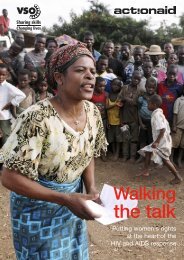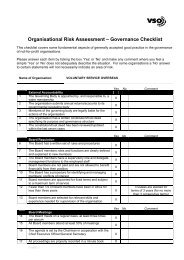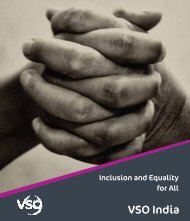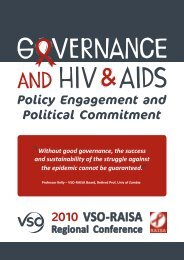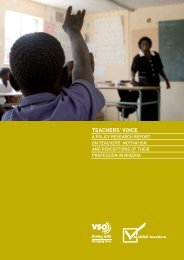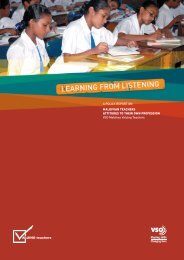Boost to salaries following Valuing Teachers Report, Cambodia - VSO
Boost to salaries following Valuing Teachers Report, Cambodia - VSO
Boost to salaries following Valuing Teachers Report, Cambodia - VSO
Create successful ePaper yourself
Turn your PDF publications into a flip-book with our unique Google optimized e-Paper software.
Case study – <strong>Cambodia</strong><br />
<strong>Boost</strong> <strong>to</strong> <strong>salaries</strong> <strong>following</strong> <strong>Valuing</strong> <strong>Teachers</strong> <strong>Report</strong><br />
Challenge<br />
Good-quality teachers are one of the most important requirements in<br />
providing high standards of education and shaping the next generation.<br />
However, in <strong>Cambodia</strong> their work and contributions have his<strong>to</strong>rically been<br />
undervalued and under-compensated. <strong>Teachers</strong> would earn less than US50$<br />
and few additional benefits. One teacher said “You spend a lot of time and<br />
money learning how <strong>to</strong> be a teacher, and then when you get a job you receive<br />
very little money”.<br />
This <strong>to</strong>ugh situation meant that teachers often lacked motivation and as a<br />
result, performance in the classroom – both of teachers and pupils – suffered.<br />
As one teacher said, who works in Kampong Cham Province, “I always feel<br />
tired with my heavy workload. I feel resentful at not being paid enough for it.<br />
We don’t want <strong>to</strong> get a second job, but feel we have <strong>to</strong> because of the low<br />
salary.”<br />
Catalyst<br />
In order <strong>to</strong> gain a better understanding of the situation of education in<br />
<strong>Cambodia</strong> and the status of teachers, NGO Education Partnership (NEP), with<br />
support from <strong>VSO</strong>, conducted a research project on teacher motivation. Since<br />
2001, NEP has become increasingly recognized as the voice of education<br />
NGOs in <strong>Cambodia</strong> and works closely with development partners and the<br />
government (Ministry of Education) in discussions supporting policy reform<br />
and implementation.<br />
<strong>Valuing</strong> <strong>Teachers</strong> is a research project which <strong>VSO</strong> have so far carried out in 14<br />
developing countries. In <strong>Cambodia</strong> <strong>VSO</strong> collaborated with NEP <strong>to</strong> examine<br />
education in the country from the teachers’ perspective, focusing on those<br />
issues that affect their motivation, morale, performance and the quality of<br />
education they can deliver. <strong>VSO</strong> provided funding and volunteers <strong>to</strong> help the<br />
staff of NEP <strong>to</strong> conduct the survey and write the report.<br />
The report showed that low salary, corruption, nepotism, poor leadership,<br />
and lack of voice were the main fac<strong>to</strong>rs which demotivated teachers. The<br />
report also recommended actions <strong>to</strong> bring these issues <strong>to</strong> the Government of<br />
<strong>Cambodia</strong>, through the Ministry of Education. There were also<br />
recommendations for NGOs, donors, regional authorities, school direc<strong>to</strong>rs,<br />
teachers, the teachers union, communities and parents.<br />
The final <strong>Valuing</strong> <strong>Teachers</strong> <strong>Report</strong> was submitted <strong>to</strong> the Ministry of Education<br />
for their response. Two Members of Parliament from the UK travelled <strong>to</strong><br />
1443430-1
<strong>Cambodia</strong> under the <strong>VSO</strong> Political Volunteer initiative. They proved <strong>to</strong> be<br />
highly effective in lobbying the Minister of education <strong>to</strong> accept the report.<br />
During a national meeting on World <strong>Teachers</strong> Day in 2009, all 400 participants<br />
received a copy of the report; the NEP Executive Direc<strong>to</strong>r presented the<br />
findings <strong>to</strong> the participants during the event which included the Ministry of<br />
Education, NGOs and teachers.<br />
Results<br />
In January 2010, the Royal Government of <strong>Cambodia</strong> confirmed its<br />
commitment <strong>to</strong> increase teachers’ basic salary by 20 per cent every year. The<br />
Secretary of State for Education announced during an Education Strategic<br />
Plan meeting that the government would increase the salary of teachers<br />
effective from that moment. The new monthly <strong>salaries</strong> of public teachers<br />
were US50$ for primary school teachers, US75$ for lower secondary school<br />
teachers and US100$ for upper secondary school teachers. The first step has<br />
been made <strong>to</strong> reaching an adequate level of pay, and it has been<br />
acknowledged that in the coming years <strong>salaries</strong> should improve more.<br />
In addition <strong>to</strong> this teachers will receive other benefits; for example an<br />
additional incentive for teachers who are willing <strong>to</strong> go <strong>to</strong> remote areas.<br />
According <strong>to</strong> the Secretary of State, the new <strong>salaries</strong> will mark a major<br />
improvement in the living standards of teachers in rural areas. However, he<br />
also raised some concerns regarding teachers who live in cities, where living<br />
costs are higher compare <strong>to</strong> rural areas.<br />
It is hoped that teacher <strong>salaries</strong> will continue <strong>to</strong> increase, and the corruption<br />
and financial management problems which prevent many teachers from<br />
accessing their money will also be resolved.<br />
2010<br />
See the <strong>Valuing</strong> <strong>Teachers</strong> page for more information on this research:<br />
http://www.vsointernational.org/what-we-do/advocacy/campaigns/valuingteachers.asp#0<br />
1443430-1


